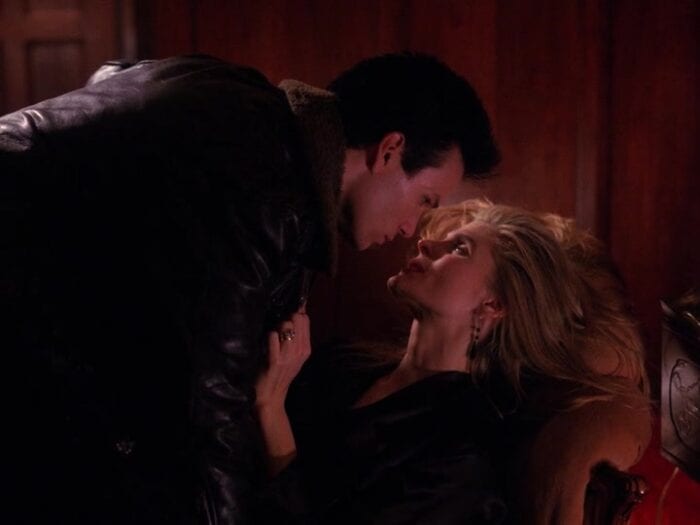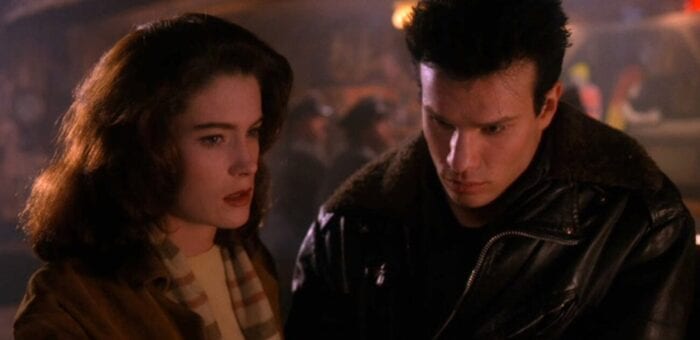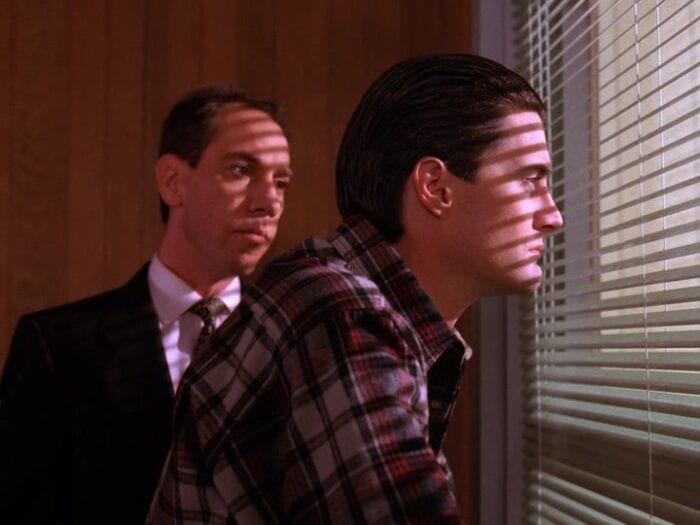Twin Peaks Episode 22 centers on relations of power. Thus, I suppose, the German title (“Slaves and Masters”), which makes me tempted to take off into an exegesis of Hegel’s Master/Slave dialectic, but I unfortunately don’t think that would be terribly fruitful. If there is a dialectic in Episode 22, it would be one without resolution, as we see more upheavals and power plays than anything else.
This is a melodrama, and the fine line between melodrama and opera is intentionally blurred through the music that plays early on at Hideout Wallie’s. It makes no sense in context—even less sense than Julee Cruise at the Roadhouse—to the extent that I found myself wondering as I viewed the episode again whether it was even intended to be diegetic. That is, do Evelyn, James, Donna, Malcolm, and the overly zealous waiter even hear this music in the bar? And what of that strange row of men in uniform with cigars?
It’s as though Twin Peaks is leaning into the soap opera version of itself, which of course has always been there. Invitation to Love has now infected what is within the frame of Twin Peaks, rather than being set off from it, but this is fully in line with the blurring of reality that proceeds throughout Season 2, and indeed in The Return.
Everywhere there are power plays in Episode 22: between Windom and Dale, Catherine and Eckhardt, Ed and Nadine, Norma and Hank, Bobby and Leo, Windom and Leo, Bobby and Hank (not pictured), Audrey and Jerry, and then of course Ben Horne’s success at overturning the result of his phantasmagorical Civil War. But while this is perhaps the most on the nose symbol Episode 22 presents us with when it comes to the upheaval of established power, it is in the culmination of the story of James and Evelyn Marsh that it most thoroughly hits its theme.
Episode 22 is not only about power, but about love—or about love in relation to power—and these much-maligned scenes show James confronting the darkness of the world and the fact that love cannot drive it out, a lesson he should have already learned through Laura Palmer, of course, but didn’t. If his interactions with Renee in The Return are any indication, he never will.

The lines that make you cringe the most are the most important ones in Episode 22, as when James insists to Donna that he just knows that he could convince Evelyn to tell the truth if given the chance, or later when he gets that chance and ends up telling her he likes how she tastes, just before Malcolm arrives to beat him over the head with the truth Evelyn has just tried to tell him—these are not good people, James. Some people will lie to your face, and perhaps even frame you for murder. Why did Evelyn do this? Because she wanted to. Listen to the words she says and stop trying to read into some other truth behind them.
Of course, there is another truth that lies in whatever Evelyn’s backstory is. Like all of the characters of Twin Peaks, she is damaged, and this is what makes her real, even if her scenes tend to be imbued with a soap-operatic quality. There are shades of the scene of Maddy’s murder when she kills Malcolm, with a similar slowing of the camera and sound design, which indicates nothing along the lines of value judgment but rather the protrusion of a certain kind of darkness above the surface of things. Despite her faults—and the fact that she messed with James’ life because it was fun—Evelyn couldn’t stand to see him killed. And so she turns the tables on Malcolm and kills him instead, but there is nothing triumphant about this scene.
When I first saw the scene in The Return in which Sarah Palmer kills a creep at the bar, I cheered. Malcolm is a worse person, who similarly assaults a woman (Donna) at a bar in Episode 22, and does so in an even more malicious way, but there is no sense of justice to his death. Evelyn has not broken free but sunken deeper into the darkness that surrounds her. And James is all messed up. Presumably, he stays so until he finds whatever kind of peace within himself that leads to his demeanor in The Return. Or is this all down to a motorcycle accident that will happen in between?

On the flip side, Episode 22 gives us a sweet scene between Ed and Norma, wherein they lament the time that they have wasted, turning all of their Christmases into a series of Mondays. Hank is going back to prison and Nadine is busy thinking she is 18. The door finally seems to be open for Norma and Big Ed, to the extent even that Nadine tells them she is cool with it as they lay half-dressed together in bed. The more striking (and hilarious) thing to me always is her preceding line informing them that she knows about their affair, as if totally oblivious to the fact that she has walked in on their post-coital cuddling, but at the same time aware of it.
Of course, Ed and Norma won’t get that future together, and as much as their scene in Part 15 of The Return (Otis Redding and all) makes my heart soar and my eyes water with tears of joy, there is a sadness to the thought that they lost another 25 years of their lives after this, separated from one another. Surely they spent them as they describe here in Episode 22, with Norma devoting herself to the Double R so thoroughly she didn’t have time to think about a life outside of work, and Ed eating soup alone, with an inner sadness pervading his being—Mondays.
Ed could never leave Nadine because he is just too good of a guy for that, and she was always hurt and broken. I don’t mean her eye but her psyche. Let’s not forget her suicide attempt in the Season 1 finale, and when she finally comes out of the teenage dream she is still living in when we see her in Episode 22, she is surely disorientated about reality. So it is not just Ed and Norma who celebrate in The Return, it is Nadine, who it would seem really has come to discover well-being for herself, however much credit we’re willing to give to Dr. Amp.
Jacoby helps Ben Horne get right with himself in Episode 22 by carrying out the “Appomattox scenario” wherein he plays Grant to Ben’s Robert E. Lee and surrenders the Civil War. Personally, I have always found all of this to be absolutely delightful, from the Great Northern staff lined up in a row carrying drums to Bobby Briggs very poorly playing the bugle. Further, Jacoby’s acting is atrocious, and the culmination of the scene, which sees Ben literally arising from his dream, is such a clear reference to The Wizard of Oz that on the nose doesn’t begin to describe it.
But this is the quirkiness of Twin Peaks and its humor. It’s not quite a joke but not quite serious either. It’s a festival of the absurd, and that absurdity runs even through the darker scenes of Episode 22, as when Windom Earle tortures Leo (the Lion, “Rawrr!”) into submission, or Catherine discusses the possibility of handing Josie over to Thomas Eckhardt (like she is a thing to be bartered) while at the same time teasing her about her dinner service.

At one point Thomas Eckhardt removes his sunglasses with all of the subtlety of a Batman “kapow!” bubble, and Twin Peaks leans hard into the absurdity of the melodrama itself. But it is no less absurd that Dale and Windom are playing chess for life and death stakes, or that Earle has apparently sent a series of packages to locations with the express intention of making a C on a map (and for no other apparent reason), then taping the map under a table for Albert to find at the power station.
And then there is Dale, who at turns seems serendipitously competent (pulling fibers from just the right coat in the large stack of dry cleaning Pete had been struggling to carry through a door moments before), and painfully daft (as he turns his head at the fact that Earle’s victim had the last name Powell—Caroline’s maiden name—and says it makes clear that Windom hasn’t forgotten anything that happened between them after Albert had earlier shown him photographs of the articles of Caroline’s clothing Earle had sent to those locations on the map). How much evidence does dear Dale need to draw the obvious conclusion?

Episode 22 ends with Cooper finding a Caroline mask on his pillow in the Great Northern. When he picks it up, a tape recorder plays an ominous message from Windom Earle. But though he tells Dale to pay close attention to the message, it is ultimately empty—“it’s your move.” Well, if this refers to the chess game, Dale already knew it was his move, and if it means that Windom is waiting for Cooper to do something in their real-life game of cat and mouse, it is a lie.
We’ve already just seen Windom preparing the note for Donna, Audrey, and Shelly with Leo’s help. He is already making his next move, and thus the closing frames of Episode 22 present more a simulacrum of a cliffhanger than an actual one.
It’s absurd, but it is supposed to be. We are to believe Dale and Windom both love Caroline in the same way we are to believe that Eckhardt loves Josie—it is more of a soap opera trope than anything. But watch these scenes retrospectively and they are imbued with terror. We know what will happen to Josie and can feel the walls closing in as Catherine and Thomas barter her like a precious object. BOB will ask, “What happened to Josie?” but the deeper question is what BOB has to do with it.
It’s the evil that men do, from Malcolm squeezing Donna’s face to the men at the Roadhouse in The Return who remove Ruby from her seat and set her on the floor. She’s treated like an object as Josie is, and doesn’t this go for Laura Palmer, as well? The iconic image is of her adorned for Homecoming, a picture in a frame. This is the image of Laura that brings back memories. And the one that Sarah smashes. She was the object of James’ affection but still also an object from his point of view. It is stark in Fire Walk with Me how he fails to see her. And it is the same in Episode 22 when he fails to see Evelyn, or fails to hear her, I should say.
Caroline is rather literally made object through the death mask left on Dale’s pillow, but more deeply she is an object insofar as she serves merely as a plot device in Twin Peaks, with her only moment as a putative subject coming in Episode 29 (after she is long dead) from a Caroline with glassy eyes. Dale confuses her with Annie. How’s Caroline?
Perhaps then Twin Peaks is about Hegel, and substance becoming subject. But it’s always a failed movement, where what bubbles up from beneath the surface is never a coherent voice but rather a primordial scream. This isn’t BOB but a response to BOB. Is it Judy? Is that Josie’s sister, or Sarah Palmer at the bar?
We’re not going to talk about Judy at all because the structures of phallogocentrism can’t make sense of her, or can only name her with a floating signifier that can’t ever find the right significatory content. But we’re way beyond Hegel now, and onto Irigaray and Cixous; beyond the edges of the chessboard; beyond masters and slaves; beyond the borders of town and into the darkness of the woods and what lurks behind the dark…


“There are shades of the scene of Maddy’s murder when she kills Malcolm, with a similar slowing of the camera and sound design.”
It’s not just sound design; it’s the distorted sound of BOB laughing that we first heard at the end of “May the Giant Be With You” (immediately after Laura’s death) and will hear again when Josie dies in “The Condemned Woman.” The real question, then, is what does it mean that we hear BOB’s laughter in a story that apparently up until now has not had him in it? Are all deaths, or at least all murders, in some ways the work of BOB, or things that attract him for garmonbozia?